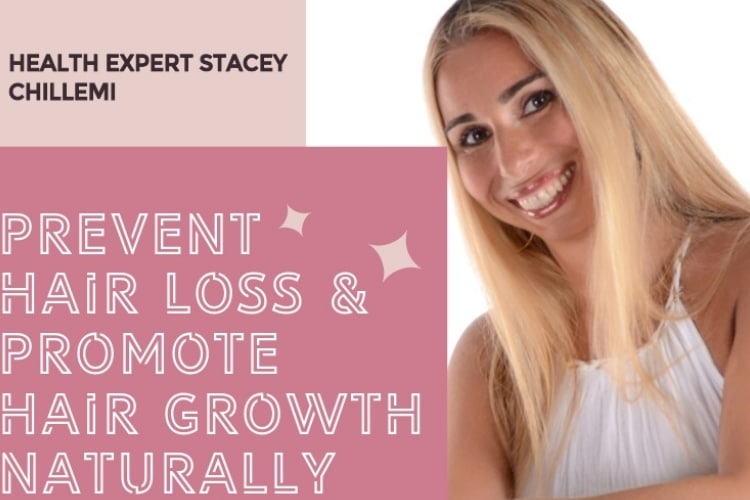
Expert Q&A with Stacey Chillemi: Why Choose Alternative Medicine Over Conventional Medicine?

Stacey Chillemi has written more than 20 books on a wide variety of subjects, from the challenges of living with epilepsy, positive thinking, alternative medicine, health, creative writing, and poetry. Her interests include creativity, meaning, of life, purpose, health and her passion for alternative medicine. She is an advocate for healing the body naturally.She has written many articles on health…
Stacey Chillemi has written more than 20 books on a wide variety of subjects, from the challenges of living with epilepsy, positive thinking, alternative medicine, health, creative writing, and poetry. Her interests include creativity, meaning, of life, purpose, health and her passion for alternative medicine. She is an advocate for healing the body naturally.
She has written many articles on health related issues for Neurology Now Magazine and she currently launched her new book, “The Complete Herbal Guide Directory: A Natural Approach to Healing the Body and Maintaining Optimal Health Using Herbal Supplements, Vitamins, Minerals, Fruits, Vegetables and Alternative Medicine.”
CureJoy got talking to Stacey about “why alternative medicine should be preferred to OTC and prescription drugs”. Here are excerpts from that interview:
Table of Contents
- Q: What are the advantages of alternative medicine over conventional medicine?
- Q: How can you be Smart and Stay Safe when using Vitamins and Supplements?
- Q: What degrees or qualifications should one look for in Alternative Health Practitioners?
- Q: Who can benefit from vitamins and supplements?
- Q: How do you research and buy vitamins, minerals, and herbal supplements
Q: What are the advantages of alternative medicine over conventional medicine?
A: Alternative medicines are fast becoming the medicines of choice for treating various kinds of ailments and conditions as they provide more benefits and without the fatal side effects from conventional (Allopathy) medicines. The term Alternative Medicine encompasses Complementary and Alternative Medicine (CAM) therapies, like Aromatherapy, Acupuncture, TCM, Ayurveda, Naturopathy, Homoeopathy, etc. which are safe and effective and have been practiced for thousands of years. Most alternative medicines can be consumed with the regular medicines and have both preventive and curative properties. All alternative medicinal therapies work on core principles of energy channels, the chakras, the mind-body connections making the treatment holistic and directed at the source of the “imbalance” rather than symptomatic as is the case with conventional medicine.
Q: How can you be Smart and Stay Safe when using Vitamins and Supplements?
A: Information about vitamins and supplements can be very confusing for most people. It is difficult to identify which ones offer genuine health benefits and fit your requirement. Tall claims made by herbal companies are hard to accept or investigate, considering the lack of studies on the effectiveness and side effects of these supplements. The only way someone should adopt these alternative yet natural therapies is only after extensive research. By learning all, you can about vitamins and supplements; you can make better choices about those that are right for you.
Q: What degrees or qualifications should one look for in Alternative Health Practitioners?
A: Most holistic health practitioners have knowledge in some or all of the following areas:
Anatomy and physiology
Human energy healing systems
Nutrition and body chemistry
Stress management and relaxation techniques
Therapeutic touch and bodywork
Spirituality in Healing
Natural remedies such as herbs, essential oils, and homeopathic preparations
A herbalist will learn the properties of many plants, including methods for preparation and contraindications. Some holistic health practitioners follow an established tradition, such as a Traditional Chinese Medicine (TCM) or Ayurveda. In this case, you should ask if they attended a holistic health school that focuses specifically their area of interest, where they learn the history of and diagnostic and treatment methods to that specific healing tradition.
Q: Who can benefit from vitamins and supplements?
A: In general, children and adults might benefit from taking one multivitamin per day. A multivitamin helps provide a consistent source of the necessary vitamins and micronutrients. According to the Harvard School of Public Health, “a daily multivitamin, and maybe an extra vitamin D supplement, is a great way to make sure you’re getting all the nutrients you need to be healthy.”
However, the very first consideration is to eat a healthy diet. Even the best supplement is no substitute for good nutrition. In many Western countries, people tend to consume foods that are high in calories but lack nutrients that are vital for good health.
Some groups of people, because of distinct nutritional needs, benefit most from taking a vitamin and supplement. These are:
- Women of childbearing age (need extra calcium and iron)
- Pregnant or lactating women
- Children and teenagers with irregular eating habits
- Seniors
- Vegetarians or vegans (may be deficient in key nutrients)
- Dieters or people avoiding certain food groups (may be deficient in key nutrients)
- People with eating disorders or medical conditions (deficiency diseases, absorption problems, lactose intolerance, etc.)
- People who often eat processed and fast food
Q: How do you research and buy vitamins, minerals, and herbal supplements
A: The safest way to purchase supplements is from a reputable vitamin or health food store, or from a health practitioner. However, not all of us have access to these types of resources. As an Internet-savvy consumer, your computer can be your best friend when it comes to choosing the right supplement for you. The amount of information available on the Web can be overwhelming, but by using the following simple steps, you can be sure you are getting reliable information about herbal or vitamin supplements.
Researching dietary supplements
Safety and Effectiveness: Before you embark on a supplement regimen, be sure that what you are going to take is safe and effective. The National Institute of Health Office of Dietary Supplements offers fact sheets on most herbal dietary supplements, including safety aspects.
Dosage: The Mayo Clinic offers a searchable database of supplements, also in the Resources and References section below. It rates the efficacy of a supplement for various health conditions, explains safety concerns, and details recommended dosage information for adults and children.
Quality: Look for “standardized” products from manufacturers participating in the US Pharmacopeia’s Dietary Supplement Verified Program or those carrying the NSF International mark of safety.
A seal from one of these organizations indicates a dietary supplement has met certain manufacturing standards, such as uniformity, cleanliness, and freedom from environmental contaminants, including lead, mercury, and drugs. Each group has different standards and processes, but the goal of each is to certify that herbal supplements meet certain safety and purity criteria.
There are many different companies marketing supplemental products. Quality does matter, so it is good to read the ingredients and warnings on the bottle and learn about the manufacturers. It’s up to you as the consumer to protect your own health – so practice caveat emptor (“let the buyer beware”), and consult your health care professional before taking any type of dietary supplements.






